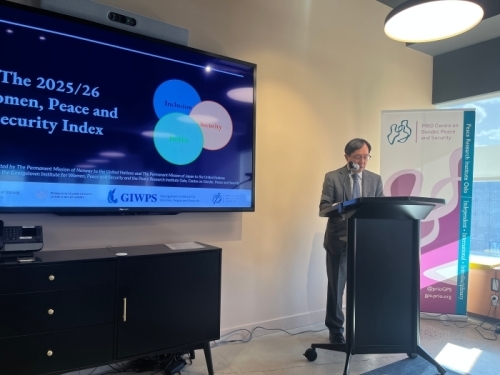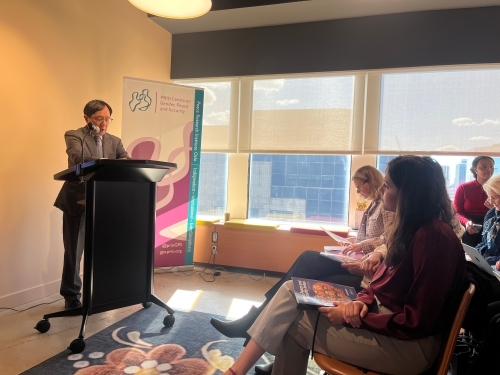Co-hosts’ Remarks by H.E. Ambassador YAMAZAKI Kazuyuki, Permanent Representative of Japan to the United Nations, at the 2025 Global Women, Peace & Security (WPS) Index Launch
2025/10/27


Distinguished guests,
At the outset I would like to extend my thanks to the Georgetown Institute for Women, Peace and Security and the PRIO Centre on Gender, Peace and Security for organizing this event, and the Norwegian Mission for co-hosting. I would also like to thank all the participants who are present today.
Japan is pleased to co-host this event on the launch of the fifth global WPS Index, particularly alongside Norwegian Mission, as we have the honor of serving together as co-chairs of the WPS Focal Points Network for 2025. In this capacity, Japan co-hosted three meetings, including a side event during the recent High-level Week that demonstrated ministerial-level commitments from all regions. Japan will continue to engage with the Network to foster inclusive dialogue, share best practices, and strengthen international cooperation.
While this year marks the 25th anniversary of the adoption of Security Council Resolution 1325, Japan is deeply concerned by the growing backlash against women’s rights. Conflict, displacement, humanitarian crises, and sexual violence continue to hamper women’s empowerment and undermine progress in implementing the WPS agenda.
In this context, the three key dimensions of women’s well-being that are covered by the index—inclusion, justice, and security—are more relevant than ever to analyze. Regrettably, the lack of significant improvement in the index’s average scores since the first edition in 2017 shows that overall progress on women’s status continues to stall. It is encouraging, however, that some of the biggest improvements in indicators have emerged from fragile and conflict-affected states. This finding should strengthen efforts by the international community, reinforcing a holistic and collaborative approach between governments, civil society and women leaders on the ground.
In the face of current challenges, now is the time to recommit ensuring full respect for the rights of women and girls. Japan attaches the highest importance to the realization of gender equality and respect for women’s rights and underscores the necessity of addressing structural barriers that hinder women’s leadership and full, equal, meaningful and safe participation in peace processes and diplomacy. To this end, Japan will host the “Next Generation Forum for Gender Equality” this December, focusing on gender issues including WPS, to promote research and discussion among young people. This initiative aims to cultivate the next generation and build networks to drive the advancement of gender equality. The commencement of Japan’s first female Prime Minister, Ms. Sanae TAKAICHI will boost the momentum behind this initiative.
I look forward to hearing today’s briefings and subsequent discussion and hope that the Index can serve as a valuable tool to inform the way forward. Japan remains committed to implementing the WPS agenda and will continue to actively engage partners in this area, including those who are present here today.
Now, I have the honor of introducing our next speaker; Melanne Verveer, Executive Director of the Georgetown Institute for Women, Peace and Security; Former US Ambassador-at-Large for Global Women's Issues.
Thank you.
